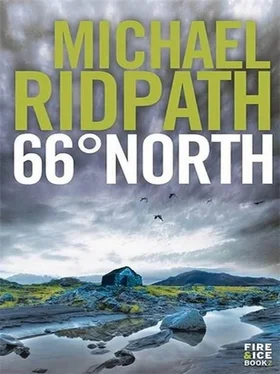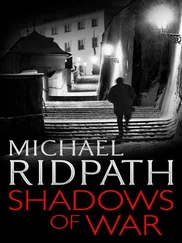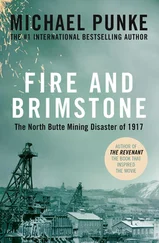They had become a refuge for a lone Icelandic kid who found himself overwhelmed by his big American Middle School. Egill was one of the most extraordinary characters from the sagas: a brave and cruel warrior, who fought against great odds in Norway and England, before returning to his farm at Borg. But he was also a poet, whose elegy to his drowned son Magnus knew by heart. It was kind of cool to be driving past his farm now.
It was a good road, almost empty of traffic. The flanks of the fells glowed orange and gold in the low autumn sun, and the sheep were rounded balls of wool, ready for the oncoming winter. Soon the Snaefells Peninsula approached, a backbone of ragged mountains with the Snaefells glacier itself a white dome at the western end capping a slumbering volcano. The entrance to the Centre of the Earth in Jules Verne’s book. Magnus took the turning at Vegamót up the pass and into the mountains. The road wound upwards, until he cleared the pass and Breidafjördur opened out before him.
He pulled over.
Beneath him was the Berserkjahraun, a frozen stream of rock spilling down towards the sea in dramatic folds of grey and green. In the foreground Swine Lake twisted around the edge of the lava, its water level low at this time of year. Then down by the seashore was the farm of Hraun, and on the other side of the little cove, nestling under its own huge fell, Bjarnarhöfn.
Magnus’s good spirits evaporated as he felt icy fingers clutch at his chest. The fears of childhood never left you. Just over the mountain to his right was the parallel pass where the Kerlingin troll stood, the stone sack of babies over her shoulder. Down in the lava field, the murdered Swedish berserkers roamed. On the heath over to the east strode the ghost of Thórólfur Lame Foot, killed by his neighbour Arnkell a thousand years before.
And in that farm down there, right now in the twenty-first century, lived Hallgrímur, Magnus’s grandfather.
Magnus shook his head. How could he, a fit thirty-three-year-old who had got through many a tough situation, be afraid of an old man in his eighties?
But it wasn’t just the man. It was the memories.
Magnus looked over to the right, beyond the mole that was Helgafell, to Stykkishólmur, a white splatter of dots by the sea. Among those dots somewhere was Unnur Ágústsdóttir with answers to other questions.
But in the meantime, he had to find Björn.
*
Grundarfjördur was twenty kilometres further west along the coast from the Berserkjahraun. It was a compact fishing village of white houses, a church and large sheds dedicated to processing fish, squeezing around a crescent-shaped harbour. Behind it a heath of browned grass and waterfalls led up to mountains. To one side, thrusting out of the sea, was a tower of green-and-grey hooped rock known as Kirkjufell or Church Fell.
Björn’s house was a small one-storey affair on the western edge of town, right by the shore, in the shadow of the rock.
No one was at home. His neighbour said that she hadn’t seen Björn for a couple of days.
Magnus drove back to the harbourmaster’s office. The harbour-master, a tall man with thinning sandy hair and glasses, knew Björn Helgason well. Over a cup of coffee he explained that Björn had sold his boat a few months before to pay off his loans, and now crewed for other captains either in Grundarfjördur, Stykkishólmur or some of the other ports along the north coast of the peninsula. There were three fishing companies in town that Magnus should try.
This he did, without success. As far as they knew, Björn was on none of their boats.
Damn! It was a risk of course, it was always a risk to interview a suspect without calling ahead first to ensure they were there, but it was a risk Magnus often took. He liked to catch them by surprise. You could tell a lot from the look on a guilty man’s face when he answered the door to the police when he hadn’t been expecting them.
Magnus dropped in on the local police station, a brown wooden building just behind the harbour. There he met an affable constable in his forties with a full moustache, named Páll. Another cup of coffee. It was clear that Páll was excited by a visit from the Reykjavík Violent Crimes Unit, although he pretended not to show it. He knew Björn well, of course. Although not from Grundarfjördur originally, Páll had been stationed there for ten years and he liked the place.
Times were tough, though, for the fishermen, both the independent operators and the fishing companies with their fish factories in town. Too much borrowing. Even here, two hundred kilometres from Reykjavík, people had borrowed too much. It was those damn bankers and that arrogant son-of-a-bitch Ólafur Tómasson.
Magnus humoured the constable as he went through the traditional kreppa litany, and asked him to keep an eye out for Björn over the next few days. He left Páll his number, and told him that he wanted to see Björn in connection with Óskar Gunnarsson’s murder.
Then, after stopping at a café in town for a late lunch, Magnus decided to take a slight detour to Stykkishólmur. Perhaps Björn was working on a boat out of there. And if he wasn’t? Well, Magnus might drop in on Unnur.
Magnus sped through the Berserkjahraun without glancing left towards his grandfather’s farm. A little further on a sea eagle heaved itself into the air, its distinctive white tail fanned out behind it, and beat a path towards a knoll. This little hill, a familiar sight from the farm at Bjarnarhöfn, was only two hundred feet high and was known as Helgafell, or Holy Mountain. One of the first settlers in those parts, Thórólfur Moster-beard, had decided that this little mountain was in fact holy and that he and his kinsmen would be swallowed up by it when they died. To preserve the sanctity of the place he insisted that no man should do their ‘elf-frighteners’ on the hill, on pain of death. Of course his neighbours did just that, defecating in full view of Thórólfur’s men, and started the first of countless feuds.
And in the church under the hill, Magnus remembered, was the grave of Gudrún Ósvifsdóttir, the heroine of another great saga, the Laxdaela .
This landscape, that had changed so little over the last thousand years, brought those sagas that Magnus had read and reread two thousand miles away to life. Each of the farms mentioned in the sagas was still there, still farmed. Bjarnarhöfn, his grandfather’s farm, was named after Björn the Easterner, Styr had lived at Hraun, Snorri the Chieftain at Helgafell, Arnkell at Bolstad just over the mountain. The farms then would have housed more people than they did now. Most of the time, just as now, they would have taken their sheep up to the fells, tended to their horses, cultivated hay in the home meadow. Except in those days every now and then the Norse farmers would stomp back and forth across the lava plain clutching swords and battleaxes to beat the shit out of each other. Magnus’s grandparents had told Óli and him some of these stories. But they had added a veneer of darkness to them that had at first thrilled and then terrified the boys.
Magnus drove into Stykkishólmur, past his old school and on to the harbour, surrounded by a jumble of multicoloured houses clad in corrugated iron, some of them quite old. At first glance the town hadn’t changed much. The large white hospital and a Franciscan convent dominated one side of the harbour. It had been strange to see the nuns, many of them from southern European countries, around town. Iceland was emphatically not a Catholic country, so the nuns and their unfamiliar ways had seemed exotic to the local kids.
The hospital was called St Francis’s, and Magnus’s Uncle Ingvar was a doctor there. It brought back memories too. Visiting Óli. Magnus’s own brief stay for an arm broken, ostensibly while falling off a haystack. The lies. The nurse who didn’t believe him. The fear of being found out.
Читать дальше












